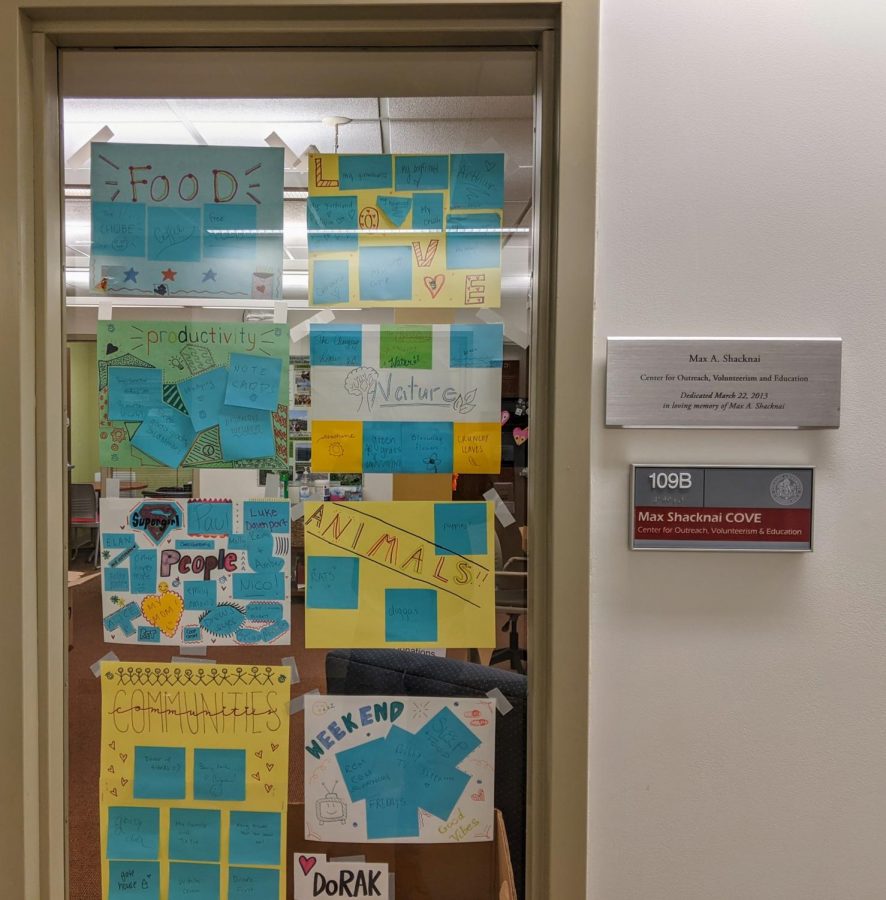Operating COVE Amid Covid-19
Since its establishment in 2001, Max A. Shacknai Center for Outreach, Volunteerism and Education (COVE) has facilitated volunteer partnerships among Colgate students and communities in the village of Hamilton, Madison County, other regions in the country and internationally. According to COVE’s director Jeremy Wattles, imperative to COVE’s mission is identifying how the organization can best meet the needs of communities and their citizens. Since the 2019 implementation of Colgate’s Third-Century Plan which seeks to make campus-wide change in terms of diversity, equity, inclusion and sustainability, Wattles and his staff have been navigating how to adapt COVE’s goals to better align with those of the plan.
“One of my goals as I headed into my second year here was to work with my staff and Dean [Paul] McLoughlin and the president’s office to flesh out … how we can better connect [with students],” Wattles said. “One thing that we’re working on is we’re trying to deepen our partnership with the Commons … I’ve heard that some students really enjoy the commons and some are filtering out what it is and how they connect to it, so I think that there is more work we can do there.”
COVE’s partnership with the commons is one of several volunteer collaborations.
“Most of my student volunteer teams work with Madison Central School. We have five volunteer groups that are active in their school,” Erin Childers-Loranty, COVE’s high school seminar coordinator, said. “High School Seminar is another COVE community partnership. This is on pause for the academic year due to COVID, but typically 14 area schools send students to participate in three-week seminars put on by Colgate faculty and staff. If you’ve ever seen Frank flooded with high school students on a Wednesday night, that’s why! We hope to resume High School Seminar sometime during the next academic year, but time will tell.”
In addition to COVE’s High School Seminar program, COVID has introduced obstacles for other volunteer partnerships.
“There are some partners that want to work with us but they don’t have the capacity right now … For example, a lot of school districts took longer to figure out how they are even going to have their day-to-day function let alone adding in the extra variable of figuring out how to have [Colgate] students in the building,” Wattles said. “Several [volunteer teams] are paused … and that’s really hard. Think about rural, low-income populations and kids and families who may already be struggling … and then compounding on top of that you have COVID, so now they’re falling even further behind in literacy and numeracy … We’re just trying to maintain communication and check-in whenever we can and assess what can we do next semester.”
In terms of creating volunteer opportunities amid COVID-19 restrictions, COVE has had to get creative this semester.
“This year our teams have adapted to provide service virtually. Many of our tutoring and mentoring teams have been meeting with local youth through Google Meet or Zoom,” Meghan Niedt, COVE’s associate director, said. “Teams that would have traditionally done hands-on activities or crafts with youth have assembled take-home activities with accompanying videos for students or created pen pal programs. Other teams have focused on fundraising for the semester. Aside from our volunteer teams, we have been hosting small scale service opportunities for students. This semester we had small groups of students work with Southern Madison Heritage Trust, the Chenango Canal Towpath Trail, Madison Lane and the Colgate Community Garden.”
If there is one silver lining of COVID-19 restrictions for the COVE, it is the inspiration for new service opportunities.
“I give a lot of credit to my colleagues and my staff for having creative ideas, so there are a couple of things we’ve done differently,” Wattles said. “During quarantine we collected non-perishable food that students didn’t eat and we donated that to a couple of local food cupboards. That was a new initiative we were able to take on. We’re going to do another collection of non-perishable food items, so that’s one [initiative] we’ve been able to add in.”
Although next semester remains uncertain, the COVE staff is optimistic that the fall semester has prepared the organization to tackle potential obstacles and expand service opportunities in the spring.
“We’ve had the fall to try out some different ways of doing service and see what works and what doesn’t — so it will be nice to go into the spring semester with that knowledge,” Niedt said. “Some of my volunteer groups have prepared packages for their community partners for the spring semester, so we won’t have to wait until students can regather to put supplies together in the spring. I would like for our student volunteers to know they are still making a difference and doing a great job, even though they may feel like they aren’t able to accomplish as much as usual.”








